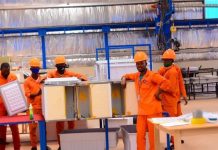Moses Asiimwe – Pascale Kunda
Africa-Press – Rwanda. Rwanda is a country of more than 1,000 opportunities,” said Michael Fairbanks, member of Rwanda’s Presidential Advisory Council (PAC) and Executive Chairman of Akagera Medicines, during the 2025 Rwanda Convention in Dallas, Texas. Rwanda’s regulatory body attained WHO Maturity Level 3, attracted world-class biotech companies like BioNTech, and began hosting regional offices for the International Vaccine Institute (IVI) and the Africa Medicines Agency (AMA). Rwanda has taken bold steps to build a suitable biotech environment for investment and growth for young talent. Rwanda’s long-term success in this field will depend on one key factor: The participation and engagement of the next generation of young Rwandans in the biotech sector.
Why Biotech Matters Now
Africa bears 25% of the global disease burden but produces less than 2% of the world’s vaccines and medicines. Africa has only 4% of the global health workforce. Rwanda intends to close this gap. It is investing in a BioPark that will host multinational companies and research institutions to promote drug discovery and development. Rwanda’s biotech sector will deliver solutions to diseases such as TB, HIV, Lassa Fever, and cancers. It will expand the country’s export market and create high-paying jobs. For a generation that believes Rwanda has “more than 1,000 opportunities,” biotech stands out as one of the most transformative.
Rwanda’s Momentum
Rwanda imports more than 95% of its vaccines and medicines. This leaves the country vulnerable to external shocks. The government is committed to local pharmaceutical production and passed conducive policies. Rwanda hosts several regional offices including the Africa Pharmaceutical Technology Foundation (APTF) and the Regional Capabilities Network (RCN) that with be hosted by the Regional Center of Excellence Vaccines, Immunization and Health Supply Chain Management (RCE-VHSM) and SyllABI. These milestones show intent — but a strong biotech sector requires people to lead these policy frameworks.
A Place for Every Talent
Biotech is multidisciplinary. Not everyone needs a PhD in biology to contribute. The first Lady, Jeanette Kagame says: “The Africa we want is one led by healthy, ambitious, empowered, creative, innovative, educated youth”. The next generation must fill the biotech with designers to build lab infrastructure, digital developers to run data systems, communicators to raise public awareness, entrepreneurs to launch startups, and economists to build sustainable business models. In a country of more than 1,000 opportunities, biotech offers room for every skillset. Young Rwandans need to view biotech as a viable career path, not an abstract or elite field. Universities, vocational institutions, and incubators must adjust their programs to reflect this demand. Internships, research mentorships, and startup grants must become routine, not exceptional.
Skills that Matter
Building a robust biotech ecosystem requires practical skills. Scientists must learn how to run clinical trials and navigate ethical approvals. Regulators must master both local and international guidelines. Legal experts must understand patents and licensing. Entrepreneurs must know how to scale and fund biotech startups. This is where training matters. Rwanda’s strategy must involve not just training more people but training them better. GIZ launched “Biomex”, a hybrid program to upskill health professionals. They are also launching TVET training programs to prepare technicians. UVU BIO is providing hands-on experience in state-of-the-art labs, and SyllABI is helping shape demand-driven curricula for biopharmaceutical manufacturing. These efforts ensure Rwanda’s young people can transform theory into practice. Rwanda’s youth have already shown, in fields like cycling, that when given the right platforms, they can turn opportunity into world-class success.
From Cycling to Biotech
Cycling in Rwanda provides a striking case study of how talent can transform a sector. Cycling was little more than a leisure activity a decade ago. Investments in training, mentorship, and infrastructure helped Rwandan cyclists begin to compete internationally, turning the sport into a source of national pride and economic opportunity. Young people saw cycling as a viable career path—and proved they could excel on the world stage. Rwanda hosts the Union Cycliste Internationale (UCI) Road World Championships for the first time in Africa in September. Biotech is poised for the same trajectory. Rwanda will become a continental leader in innovation and health technology when the youth treat biotech as they did for cycling—seizing opportunities, training relentlessly, and thinking globally.
How to Participate
Rwandan youth interested in biotech may enroll in GIZ, UVU BIO and IVI training programs, or pursue master’s and PHD programs at RCE-VIHSM. Entrepreneurs may apply to incubator hubs such as the Africa health tech hub and Jasiri. Those focusing on digital health and bioinformatics may take classes from the Rwanda coding academy and ALX. Young Rwandans can also build experience through internships at different pharmaceutical, biotech, and digital health companies.
Conclusion
Rwanda’s biotech transformation is rising. In a nation of more than 1,000 opportunities, biotech might be the one that defines its future. The next generation has a role to play. Rwanda is ready. Labs are waiting, Classrooms are ready, Opportunities are here. Young Rwandans must seize the moment.
Source: The New Times
For More News And Analysis About Rwanda Follow Africa-Press






